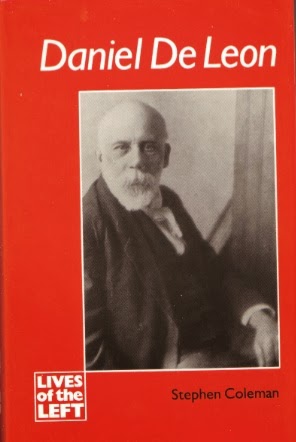Thanks go to La Bataille socialiste blog for originally putting this on the net.
This biography is a study of uncompromised revolutionary hope and dismal political failure. The story of Daniel De Leon is not that of a populist leader or a radical legislator, but of a militant and unswerving Marxist and irrepressible socialist activist who could see what was wrong and what must be changed in the mean and sordid atmosphere of turn-of-the-century American capitalism. The wrongs which he exposed and the change which he sought concerned not only the nature of capitalism itself, but also the ways in which that system tends to dominate and misdirect efforts to resist it. The wrongs were to outlive De Leon; the change has yet to come. Still, people of reason argue with passion, and sometimes despair, about why socialist ideas have never taken root in the USA; why the American working class has been so successfully accommodated within the capitalist system; why the message of De Leon has been utterly unheeded. It is to be hoped that this biographical study of the pioneer of American Marxism will contribute to an explanation of the hopes and failures which characterised the early socialist tradition in the USA.
Writers of history have not been kind to Daniel De Leon. Apart from the generally uncritical hagiographical accounts of his life written by De Leonists in defence of their tradition, most historians have mentioned De Leon only in passing, usually disparagingly and often inaccurately. When I first came to study the history of socialist thought in the USA, I was surprised (and irritated) to discover that no serious scholarly work dealing exclusively with De Leon’s ideas has been published. It reminded me of the absence of serious scholarly works on the great English Marxist, William Morris, which had at one time been a feature of British socialist historiography. It was clear to me from the outset that De Leon was a figure of major intellectual importance in the history of American socialist thought, and it was just no good for his life and ideas to be left to the realm of superficial caricature. As I embarked upon a study of De Leon’s writings and speeches it became obvious that I was considering a substantial political theorist, an evaluation of whom should not be clouded by tedious psychological investigations or other long-obsolete sectarian squabbles. In the time that I have written this book, I have come to conclude that most of the original attacks upon De Leon were motivated by the fact that he would not abandon his principles in order to court the kind of popularity socialists often attract when they stop being socialists. The secondary critics of De Leon have too often been inclined simply to regurgitate the prejudices of those who wrote before them without comprehending the political context of such prejudices. I must plead guilty to an absence of biographical interest in the deeper qualities or defects of De Leon’s personality, nor would I expect others to evaluate the political ideas of a Marx, a Mill or a Morris on the basis of criteria which are best left to computer dating agencies. In so far as De Leon’s character influenced his effect as a political thinker and activist such matters are considered in the following pages. It is my hope that readers will be motivated by this account of De Leon’s life to turn next to his many very readable and easily available writings, in which are to be found some of the soundest and most straightforward Marxist thinking between the years 1890 and 1914. The account which follows is intended to clarify the context and meaning of such writings as well as to raise a number of criticisms which the open-minded reader will want to consider.
I acknowledge with gratitude the contributions to the production of this book of several people. Melvin Harris, whose profound intellectual generosity has been an inspiration to me, allowed me free access to his unique collection of material by and on De Leon; furthermore, the discussions I had with him and the suggestions I received helped me immensely to understand some of the important themes examined in this book. Frank Girard entertained me while I was researching in the USA, offered me the benefit of his years of scholarly and committed reflection upon De Leon’s contribution to the socialist movement, and (together with Ben Perry, with whom he is writing what promises to be an excellent history of the Socialist Labor Party) gave me insights into the De Leonist tradition which I could not have obtained otherwise. Adam Buick has encouraged and, sometimes, directed my research, especially into De Leon’s conception of socialism. Clifford Slapper’s very useful comments on the text and consistently intelligent suggestions of ways to improve both the stylistic and political quality of this book are much appreciated. I have received useful information from Edmund Grant, Ronald A. Sims, John O’Neil, Louis Lazarus and a number of others in the USA who did not know me personally but who heard that I was writing about De Leon and were kind enough to send me literature by, or about, him. In expressing my sincere thanks to these people, I must make clear that I take responsibility for any errors of fact or fault of interpretation which may have found their way into the text. I would also like to thank Sally McCann for her diligent and very helpful work in copy-editing this book. Above all, I dedicate this book to my father, who first taught me about the importance of history and the vision of socialism, which, when combined, can change the world; without his support over many years, this book could never have been written.
Stephen Coleman


No comments:
Post a Comment